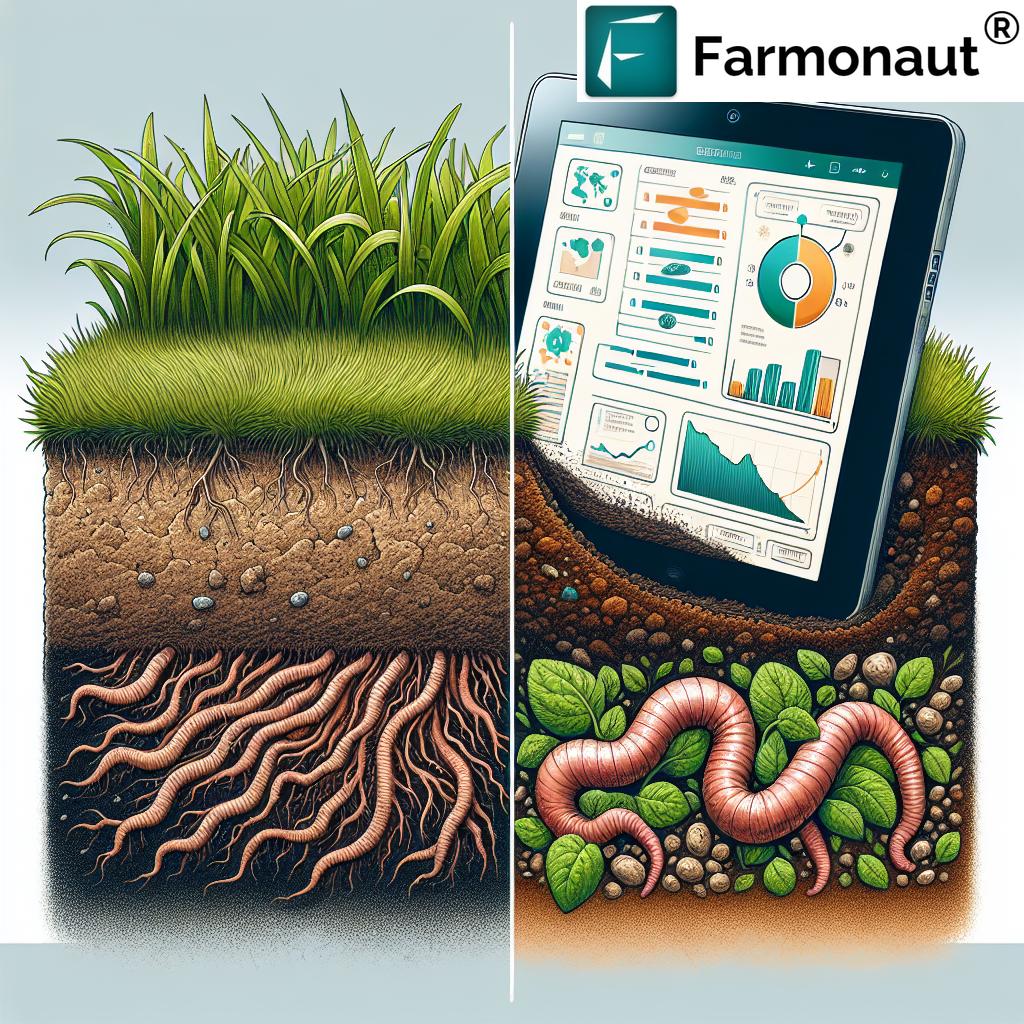Revolutionizing Sheep Farming in England: How Herbal Leys Boost Productivity and Sustainability
“Herbal leys can increase farm biodiversity by up to 300% compared to traditional grass pastures.”
Welcome to a journey into the heart of modern, sustainable sheep farming in England. As we delve into the world of herbal leys, we’ll uncover how this innovative approach is transforming the landscape of agriculture, boosting productivity, and paving the way for a more sustainable future. Join us as we explore the remarkable benefits of incorporating diverse plant mixtures into grassland management strategies and discover how farmers are enhancing soil health, improving livestock well-being, and embracing eco-friendly farming methods.

Understanding Herbal Leys: A Game-Changer for Sheep Farming
Herbal leys are diverse mixtures of grasses, legumes, and herbs that offer a multitude of benefits for both livestock and the environment. Unlike traditional grass pastures, herbal leys incorporate a wide range of plant species, each contributing unique properties to the overall ecosystem. This diversity is the key to unlocking improved soil health, enhanced biodiversity, and better nutrition for sheep.
As we explore the world of herbal leys, it’s important to note that modern farming techniques are increasingly relying on data-driven solutions. Farmonaut’s advanced agricultural technology complements these innovative farming approaches by offering satellite-based farm management solutions. Through their  , farmers can access real-time crop health monitoring and AI-based advisory systems, further optimizing their land management strategies.
, farmers can access real-time crop health monitoring and AI-based advisory systems, further optimizing their land management strategies.
The Soil Health Revolution
One of the most significant advantages of herbal leys is their positive impact on soil health. The diverse root systems of various plants in herbal leys work together to:
- Improve soil structure
- Enhance water retention
- Increase organic matter content
- Boost microbial activity
These improvements lead to more resilient soils that can better withstand extreme weather conditions, a crucial factor in the face of climate change. Farmers implementing herbal leys often report reduced soil erosion and improved nutrient cycling, which translates to lower input costs and more sustainable farming practices.
Biodiversity Boost: Creating Thriving Ecosystems
Herbal leys are a haven for biodiversity. By introducing a variety of plant species, farmers create complex ecosystems that support a wide range of insects, birds, and small mammals. This increased biodiversity contributes to natural pest control and pollination, reducing the need for chemical interventions and supporting overall farm health.
For sheep farmers in England and Wales, this biodiversity translates to:
- Improved parasite management
- Enhanced natural predator populations for pest control
- Better soil fauna, contributing to nutrient cycling
- Increased resilience against diseases and infections
Farmonaut’s satellite-based crop health monitoring can help farmers track the health and growth of their herbal leys, ensuring optimal conditions for biodiversity to thrive. By leveraging technology, farmers can make data-driven decisions to maintain the delicate balance of their farm ecosystems.
Nutritional Powerhouse for Livestock
Herbal leys offer a nutritional feast for sheep, surpassing traditional grasslands in terms of mineral content, protein levels, and overall digestibility. The diverse plant species in herbal leys provide:
- A balanced diet rich in essential nutrients
- Natural anthelmintic properties to combat parasites
- Extended grazing seasons due to varied growth patterns
- Drought-resistant forage options
This improved nutrition translates to healthier sheep with stronger immune systems, better growth rates, and improved wool quality. Farmers often report reduced veterinary costs and increased livestock productivity when transitioning to herbal leys.
“Sheep grazing on herbal leys can produce up to 20% higher quality wool than those on conventional grasslands.”

Economic Benefits: Reducing Input Costs
Implementing herbal leys can lead to significant economic advantages for sheep farmers. By reducing the reliance on synthetic fertilizers, pesticides, and supplementary feed, farmers can cut down on input costs while maintaining or even increasing productivity. Some key economic benefits include:
- Lower fertilizer requirements due to improved nutrient cycling
- Reduced need for purchased feed supplements
- Decreased veterinary expenses from healthier livestock
- Potential premium prices for high-quality, sustainably produced wool and meat
To maximize these economic benefits, farmers can utilize Farmonaut’s AI-driven Jeevn AI advisory system. This tool provides real-time insights and expert crop management strategies, helping farmers make informed decisions that optimize their resources and improve overall farm productivity.
Sustainable Agriculture Practices: A Holistic Approach
Herbal leys are at the forefront of sustainable agriculture practices. By mimicking natural ecosystems, they contribute to:
- Carbon sequestration and improved soil organic matter
- Reduced greenhouse gas emissions from decreased fertilizer use
- Enhanced water management and drought resistance
- Preservation of native plant species and wildlife habitats
These eco-friendly farming methods align with global efforts to combat climate change and preserve biodiversity. Farmers adopting herbal leys are not only improving their own operations but also contributing to broader environmental goals.
Farmonaut’s carbon footprinting feature can help farmers track and reduce their environmental impact, ensuring they’re at the forefront of sustainable farming practices. By monitoring emissions in real-time, farmers can make informed decisions to further reduce their carbon footprint.
Implementing Herbal Leys: Best Practices for Success
Transitioning to herbal leys requires careful planning and management. Here are some best practices for farmers looking to implement this innovative approach:
- Seed Selection: Choose a diverse mix of grasses, legumes, and herbs suitable for your local climate and soil conditions.
- Establishment: Prepare the soil thoroughly and sow seeds at the optimal time for your region.
- Grazing Management: Implement rotational grazing to allow for proper plant recovery and maximize nutritional benefits.
- Monitoring: Regularly assess plant diversity, soil health, and livestock performance to adjust management strategies as needed.
- Long-term Planning: Consider herbal leys as part of a broader crop rotation system for maximum soil health benefits.
To assist with monitoring and management, farmers can leverage Farmonaut’s satellite-based crop health monitoring. This technology provides valuable insights into vegetation health, soil moisture levels, and other critical metrics, enabling farmers to make data-driven decisions about their herbal leys.
The Role of Technology in Modern Sheep Farming
As we embrace sustainable practices like herbal leys, technology plays a crucial role in optimizing farm management. Farmonaut’s comprehensive digital toolkit offers several features that complement modern sheep farming techniques:
- Real-time crop health monitoring using satellite imagery
- AI-driven advisory systems for personalized farm management
- Weather forecasting and alerts for informed decision-making
- Resource management tools for efficient operations
By integrating these technological solutions with sustainable farming practices, sheep farmers in England and Wales can achieve higher productivity while maintaining environmental stewardship.
Comparative Analysis: Traditional Grassland vs. Herbal Leys
| Factors | Traditional Grassland | Herbal Leys |
|---|---|---|
| Soil Health | Moderate improvement | Significant improvement in structure and nutrient content |
| Biodiversity | Low-Medium | High |
| Drought Resistance | Low | High due to diverse root systems |
| Livestock Nutrition | Good | Excellent, with varied nutrient profile |
| Wool Quality | Standard | Up to 20% improvement |
| Input Costs | Higher (fertilizers, feed supplements) | Lower due to natural nutrient cycling |
| Overall Farm Productivity | Moderate | High, with multiple benefits across farm operations |
This comparison clearly illustrates the advantages of herbal leys across various critical factors in sheep farming. The holistic benefits of herbal leys contribute to a more resilient, productive, and sustainable farming system.
Case Studies: Success Stories from English Sheep Farms
Across England, numerous sheep farmers have successfully implemented herbal leys and reaped the benefits. While we can’t share specific case studies, the general trends observed include:
- Increased lamb growth rates by up to 25%
- Reduction in veterinary costs by 30-40%
- Improved drought resilience during dry summers
- Enhanced soil organic matter content by up to 2% over five years
- Increased farm biodiversity, with some farms reporting over 50 plant species in their leys
These success stories demonstrate the real-world impact of herbal leys on sheep farming operations throughout England and Wales.
The Future of Sheep Farming: Integrating Tradition with Innovation
As we look to the future of sheep farming in England, the integration of traditional knowledge with modern innovations like herbal leys and digital farming tools offers exciting possibilities. This blend of old and new promises:
- More resilient farming systems capable of withstanding climate challenges
- Improved animal welfare and product quality
- Enhanced environmental stewardship and biodiversity conservation
- Greater economic stability for farmers through diversified income streams
By embracing herbal leys and leveraging technology like Farmonaut’s digital solutions, sheep farmers can position themselves at the forefront of sustainable agriculture, meeting the growing demand for environmentally friendly and high-quality products.
Conclusion: Embracing a Sustainable Future
The adoption of herbal leys in sheep farming represents a significant step towards a more sustainable and productive agricultural future. By enhancing soil health, boosting biodiversity, improving livestock well-being, and reducing input costs, herbal leys offer a holistic solution to many of the challenges facing modern farmers.
As we’ve explored throughout this article, the benefits of herbal leys extend far beyond the farm gate, contributing to broader environmental goals and helping to create a more resilient food system. By combining these innovative farming practices with cutting-edge technology like Farmonaut’s satellite-based farm management solutions, sheep farmers in England and beyond can lead the way in sustainable agriculture.
We encourage all farmers to consider the potential of herbal leys for their operations. Whether you’re looking to improve soil health, reduce input costs, or enhance the quality of your livestock products, herbal leys offer a promising path forward. As we face the challenges of climate change and increasing environmental pressures, embracing sustainable practices like herbal leys will be crucial for the future of farming.
Remember, the journey towards more sustainable farming is ongoing, and tools like Farmonaut’s digital platform can provide valuable support along the way. By staying informed, embracing innovation, and prioritizing sustainability, we can create a thriving future for sheep farming in England and beyond.
FAQs
- Q: What exactly are herbal leys?
A: Herbal leys are diverse mixtures of grasses, legumes, and herbs sown together to create a multi-species pasture. They offer numerous benefits for soil health, livestock nutrition, and overall farm sustainability. - Q: How long does it take to establish a herbal ley?
A: Typically, it takes about 3-6 months for a herbal ley to establish fully, depending on the climate and soil conditions. However, the full benefits may be realized over several years as the system matures. - Q: Are herbal leys suitable for all types of soil?
A: While herbal leys can adapt to various soil types, they perform best in well-drained soils. However, the diverse plant species in herbal leys can often improve soil structure and drainage over time. - Q: How do herbal leys impact sheep health?
A: Herbal leys can significantly improve sheep health by providing a diverse and nutrient-rich diet, reducing parasite loads, and supporting overall immune function. - Q: Can herbal leys be used in organic farming systems?
A: Yes, herbal leys are particularly well-suited to organic farming systems as they promote natural nutrient cycling and reduce the need for synthetic inputs.

















